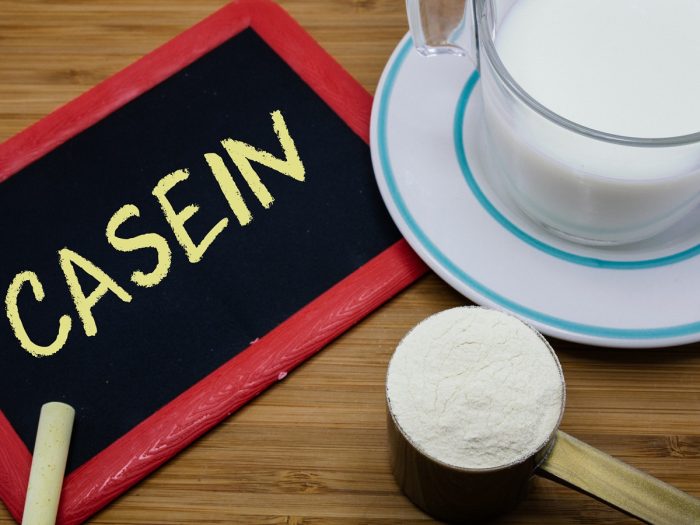Casein is a protein found in cow’s milk, a phosphoprotein that contains all nine essential amino acids.
What is Casein
Casein is the primary protein found in cow’s milk, composing roughly 80% of the protein in the milk. 20% of most cow’s milk is composed of whey protein. Casein protein is rich in various key nutrients, such as carbohydrates and amino acids, as well as certain essential minerals. It takes longer to digest this type of dairy protein by the body. [1]
It has slightly more carbohydrates, iron, and calcium than whey protein, although whey protein is considered to be better for your immune health and influences certain transport processes in the body. The main difference in the behavior of these two proteins is that casein is digested at a much slower rate, forming a gel-like substance in the stomach that allows amino acids to be slowly taken in.
Importantly, there are multiple types of casein protein in cow’s milk, including the two most common forms:
- A1 beta-casein
- A2 beta-casein
These two forms are found in greater concentrations in different breeds of cows; specifically, cows with high levels of A1 often originated in Northern Europe, while cows with higher levels of A1 beta-casein originated in southern France and the Channel Islands, among other locations. [2]
Some studies claim that A2 is a healthier variety of casein, but the debate continues.
Source of Casein
The primary source of casein protein is from cow’s milk, but casein is also readily available in the form of cheese, as it plays an important role in the production of this globally loved dairy product. While there is a good amount of casein available in regular milk, the concentration is higher in cottage cheese and yogurt, with a single cup of each containing roughly 27 grams and 20 grams of protein, respectively.

Casein protein powder, milk in a cup and saucer, chalk, and a small blackboard with casein written on it. Photo Credit: Shutterstock
Benefits of Milk Casein
The benefits of casein include its ability to boost muscle development, increase energy levels, reduce muscle breakdown, improve the immune system and protect heart health, among others. [3]
- Muscle Growth – Due to the slow digestion of casein protein, it provides a low level of amino acids to the muscle cells over an extended period of time. This can lead to better results in terms of muscle growth than a whey protein supplement, for example. Furthermore, the body will often consume its own muscle for amino acids when protein intake is low, so the slow digestion and doling out of casein amino acids can help reduce muscle breakdown! [4] [5] [6]
- Energy Levels – Although the digestion of casein is slower, it can help to even out your energy levels, as some of it is consumed for fuel. It provides more consistent and long-lasting energy to the body.
- Immune System – There have been a number of studies, such as this one published in Food and Chemical Toxicology, that suggest casein protein has certain immunological and antibacterial effects, which can reduce the strain on your immune system. [7]
- Antimicrobial Effects – According to the 2016 study, peptides isolated from casein protein may have inhibitory effects against various microbes that include E. Coli and Streptococcus mutans. [8]
- Heart Health – Casein protein is known to lower triglyceride levels in animal subjects, which may help prevent hypertension, cardiovascular disease, and other heart-related issues. [9] [10]
- Weight Loss – Although research on this is limited, it appears that casein protein can result in fat loss when regularly consumed. It is positively correlated with a reduction in weight, as explored in this review from the British Journal of Nutrition. [11]
- Antioxidant Properties – Some studies also suggest the antioxidant effects of milk casein that may help in reducing the free radical activity. [12] [13]
Side Effects of Casein Protein
There are very few side effects reported in relation to taking casein, either in supplement form or from dairy products. Some people do report feeling bloated or having gastrointestinal issues, but these are temporary and essentially harmless. [14]
There are no known dangers of consuming an excess of protein, provided you don’t have kidney or liver disease, which can be exacerbated by consuming too much protein.
Casein Allergy
Some people do have an allergy to casein, or to lactose, which is commonly found in dairy products that haven’t had the lactose intentionally removed. Additionally, some casein supplements could also contain lactose and may cause similar side effects as consuming milk and dairy products, for those with lactose intolerance or a casein allergy. [15]
Allergic symptoms may range from a mild rash or swelling in the lips, mouth, and throat, to more serious gastrointestinal issues, headaches and dizziness. People with milk intolerance or lactose intolerance should exercise caution and consult a medical practitioner before incorporating casein into their diet.
Do not add casein supplements to your diet until clearing it with your doctor or nutritionist.
How to Consume Casein Protein for Best Results
There are no firm rules on how or when to take casein supplements, but most experts recommend taking them at certain key times of the day.
- Prior to a workout – Having casein a few hours before a workout will ensure that your body has a slow drip of amino acids that can help with energy and muscle performance during your exercise.
- Before Sleeping – Since the body does most of its repair and healing while we sleep, providing our system with the building blocks of protein on a slow drip from casein protein is a good strategy. [16]
- Between Meals – If you want to avoid excess snacking, having casein between meals may help you curb cravings and keep your energy levels stable between meals.
